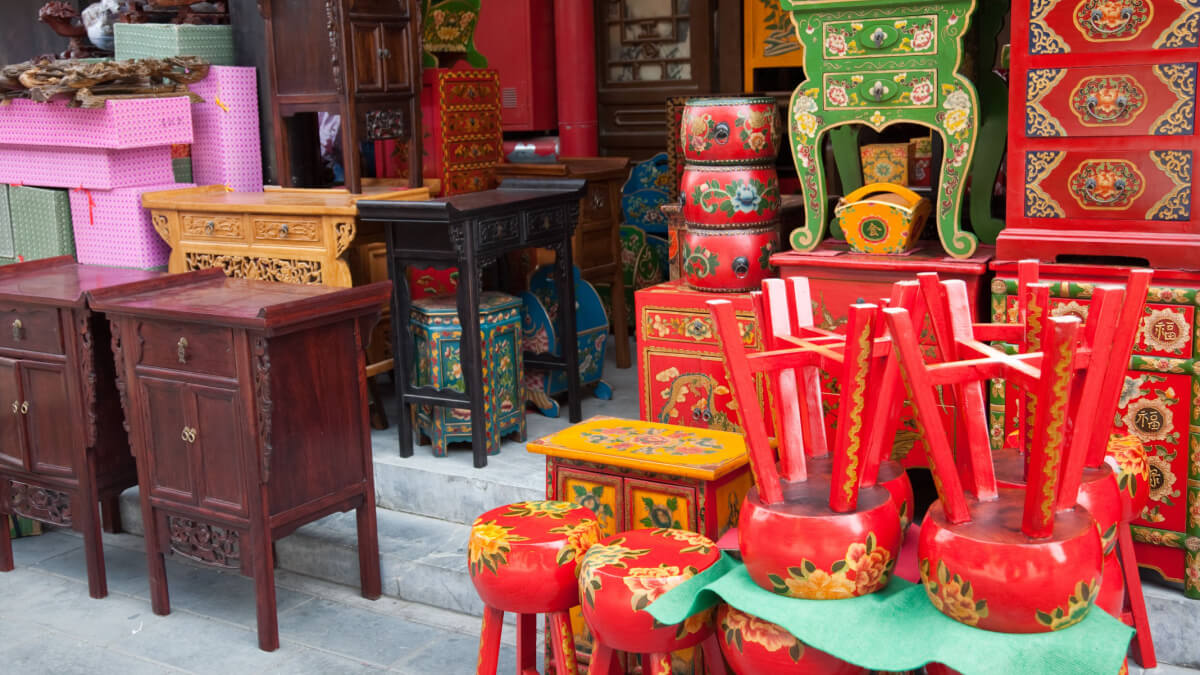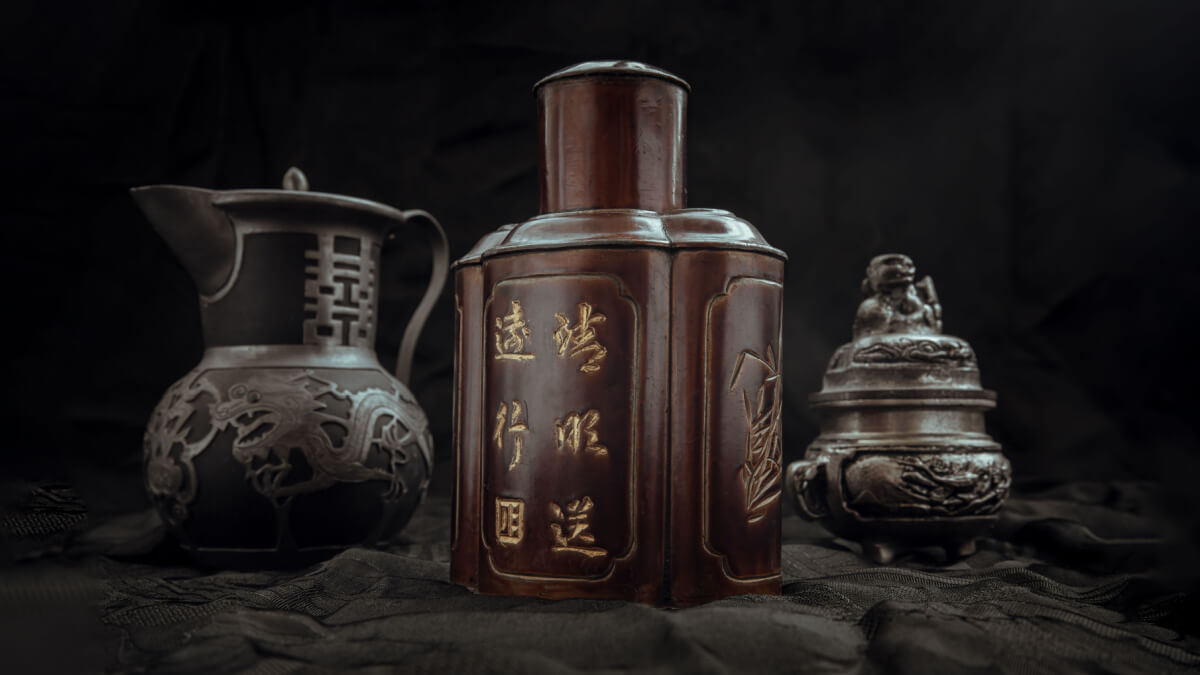Cash or card in China: Which is the best way to pay?
Should you pay with cash or card in China? A handy guide including alternative payment methods, cash etiquette, Chinese ATMs and using your UK card.

If you’re an antiques lover or collector from the UK, China is a fantastic place to pick up a unique treasure.
Chinese porcelain, textiles, sculpture, paintings and furniture are renowned for their beauty and craftsmanship, as well as for the rich cultural and historical context which inspired them.
But in such a vast country, where do you begin your search for that one special piece? We’re here to help, with our essential guide to buying antiques in China.
This includes a look at the best antique shops in China, along with markets and dealers. We’ll give you some tips on local customs for haggling and buying, along with info on how to get your purchases back home to the UK.
And if you need a smart way to purchase antiques in Chinese yuans, without losing out to poor exchange rates and high fees - check out the Wise account from the money services provider Wise.
Please see the Terms of Use for your region or visit Wise fees & pricing for the most up-to-date information on pricing and fees.
| Table of Contents |
|---|
Yes, you can buy antiques in China as a foreigner, but there are quite a few important laws and restrictions you need to know about.
The Chinese government has a number of regulations in place relating to the sale and export of antiques. Anything produced before 1949 is considered to be a ‘cultural relic’ and can’t be legally exported without government approval. This comes in the form of an official red wax seal known as a jianding. This indicates that the item is genuine and has official approval for export.¹
This means you can buy some older antiques and take them back to the UK, but only if they have this all-important wax seal. It’s also possible to request an inspection of an item. If it meets the requirements, the government can at its discretion issue the item with a seal - then it can be legally exported.¹
There are a number of places to hunt out unique and beautiful antiques in China.
Hotspots for antique shopping include:
In China, you can head to specialist antiques stores, dealers or auction houses if you’re after something in particular.
Or you can browse the many street markets and bazaars to uncover an unexpected treasure. You’ll need to be patient though, as there are a lot of replicas, counterfeits and tourist trinkets around.
| 📚 Read more: The best UK bank accounts for travelling and travel insurance |
|---|
If you love the hustle and bustle of a market, China has plenty to choose from. You’ll just need to be prepared to sift through plenty of souvenirs, mass-produced items and second-hand junk to uncover those special pieces. And of course, you’ll need to dust off your haggling skills to get them at a great price.
Here are just a few of China’s best antiques and vintage markets, spread across the country:

There are also a number of renowned antiques shops in China, along with auction houses, warehouses and whole districts of vintage stores.
Some of the best antiques and vintage shops in China include:²
If it’s your first time antique shopping in China, you’ll need to know about the local customs. Here are some helpful tips to help you shop safe and smart, and get the best deal:
If cards are accepted at the particular antiques store you’re buying at, the Wise card is one of the best you can use.
The Wise card automatically converts your British pounds to Chinese yuan when you spend, for just a small conversion fee. Best of all, it does the conversion at the mid-market exchange rate. This means you get more yuan for your pounds, so you can splash out a little more at the flea market.
Learn more about the Wise card 💳
Please see the Terms of Use for your region or visit Wise fees & pricing for the most up-to-date information on pricing and fees.
Have something special in mind? Or happy to browse and see what you uncover? Whichever is the case, it’s useful to know the best places to go for each category of antiques. We’ve put together a few tips below.

For furniture, your best bet is a specialist dealer or furniture market, such as the Jinzhan Antique Furniture Market in Beijing.
You can also try antiques shops which specialise in a particular era or type of furniture, like many of the stores in Gaobeidian Classical Furniture Street, also in Beijing.
If you’re prepared to sift through plenty of junk, you’re likely to uncover maps and postcards at some of the better flea markets in China.
You can also go to a curio shop, like Yunzhou Curio City in Shanghai, to browse coins, old banknotes, jewellery, postcards, posters and much more.
There are a few good places to pick up vintage clothing and textiles in China. Your best bet is in Shanghai, which has lots of vintage and retro clothing shops. Make sure to stop by Lolo Loves Vintage, Annata Vintage and Emporium Vintage.⁷
For everything else, flea markets are the places to go. Be on high alert for counterfeit and replica products though, as they are common in Chinese markets.
And if you’re searching for a specific item, you may be best researching the specialist dealers and shops in the area.
| 📚 Read more: 7 best UK-issued prepaid travel cards for Europe |
|---|
So you’ve tracked down something fabulous, and have negotiated the price to secure the sale. The next challenge is figuring out how to ship your purchases back home from China to the UK.
The first and most crucial thing to remember is that it is illegal to import Chinese antiques that don’t have the official government-issued red wax seal. If unsure whether your item is suitable for exporting back to the UK, it’s always smart to double-check - because the penalties can be severe.
For items you are allowed to import from China to the UK, it’s recommended to work with a third party importer or shipping company. This is especially the case for larger or more valuable items. There are likely to be customs regulations and paperwork to navigate, along with taxes and duties to pay. It can be complicated, and getting it wrong can be costly.
It may be the case that the antiques dealer you buy from can recommend a suitable shipping company.
Antiques dealers tend to be specialists in their own area, such as in a particular era or type of furniture.
So to find the best China antique dealers, you may need to do some research. You could also potentially work with UK-based experts with specialist knowledge of the Chinese antiques market.
With your Chinese antiques safely shipped back home in the UK, all that’s left to do is find the perfect spot to display them.
It’s also a good idea to research how best to care for the item, especially for anything rare or fragile. A good source of information can be the seller you bought it from, so it’s worth asking before you leave China.
Getting insurance is also essential for valuable items, and you might want to install a security system too.
And there you have it - your essential guide to buying antiques in China. It’s a huge country known for its beautiful selection of antiques, but you need to know where to look.
You also need to watch out for fakes and counterfeits, and make sure you follow Chinese government laws on what you are and aren’t allowed to export.
But hopefully after reading this, you’ll have an idea of where to start planning your antiques shopping trip in China.
And, if you want a transparent, low-cost way to handle your travel expenses abroad, check out the Wise account and get the Wise card to spend with a fair exchange rate.
Please see the Terms of Use for your region or visit Wise fees & pricing for the most up-to-date information on pricing and fees.
Sources used for this article:
Sources checked on 20-Oct-2023.
*Please see terms of use and product availability for your region or visit Wise fees and pricing for the most up to date pricing and fee information.
This publication is provided for general information purposes and does not constitute legal, tax or other professional advice from Wise Payments Limited or its subsidiaries and its affiliates, and it is not intended as a substitute for obtaining advice from a financial advisor or any other professional.
We make no representations, warranties or guarantees, whether expressed or implied, that the content in the publication is accurate, complete or up to date.

Should you pay with cash or card in China? A handy guide including alternative payment methods, cash etiquette, Chinese ATMs and using your UK card.

A guide to the annual Qixi Festival, a traditional Chinese festival celebrated in China, Taiwan, Singapore and other parts of Asia.

If you’re planning a trip abroad you should do some research to stay safe and healthy on your journey. With plenty to do and see, China is a very popular...

China isn't just a country, it's a fascinating mix of centuries-old traditions and cutting-edge technology, a blend that makes every moment here a discovery....

If you’re visiting China, you’ll want to stay informed of the financial basics. This guide will cover the Chinese currency, where to find money, and the...